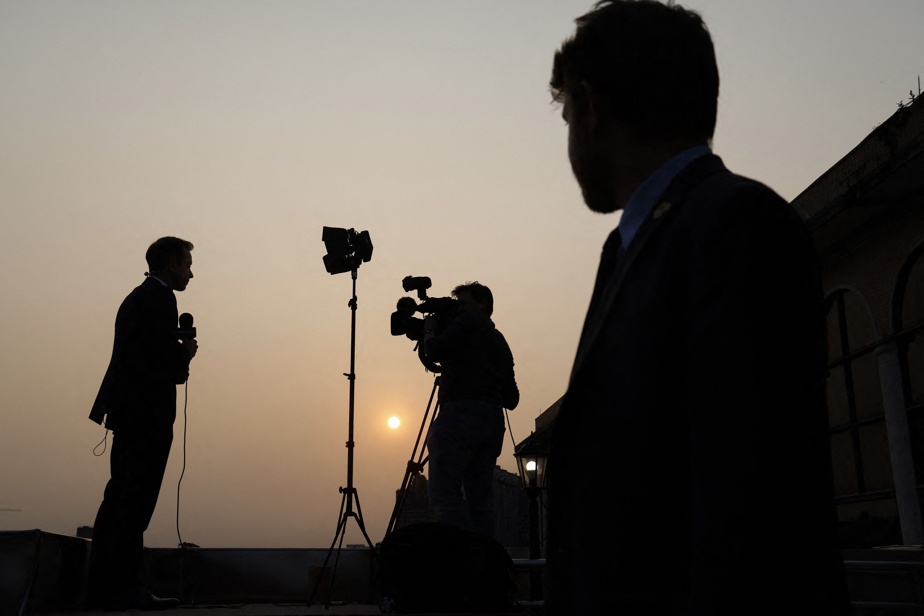The number of countries offering optimal conditions for journalists continues to decline, according to the latest world press freedom rankings by Reporters Without Borders (RSF).
The annual ranking of press freedom produced by Reporters Without Borders indicates that conditions for journalistic practice are optimal in a very limited number of countries.
Media representatives are confronted with increasingly frequent displays of aggression on social networks, but also in the physical world.
India and Turkey have fallen sharply in the rankings for 2023, while Brazil has risen sharply.
The United States, which has fallen sharply in the rankings in recent years, fell another three places.
In 2023, the situation is considered “good” in only 8 of the 180 states assessed by the organization, or 4.4% of the total, compared to 17 in 2018 and 26 in 2013. It is “fairly good” in 44 others.
In 10 years, the number of countries where the situation was considered “very serious” has increased at the same time, from 20 to 31 this year, or 17.2% of the total.
Considering also those where journalists face a “problematic” or “difficult” situation, RSF notes that working conditions are poor in two-thirds of the countries included in the ranking, a proportion that remained substantially unchanged during the period under review.
RSF Secretary General Christophe Deloire said in a statement accompanying the release of the new ranking on Tuesday that fluctuations in press freedom were partly a reflection of “growing animosity towards journalists on social media. and in the physical world”.
They are also, he pointed out, a reflection of the growing weight of disinformation, which is generated with increasingly sophisticated tools to blur the lines between reality and fiction.
These increased capacities are used to “weaken” those who seek to do quality journalism, notes RSF, which is particularly alarmed by the possibilities offered by artificial intelligence.
The release of fabricated photos of the arrest of former US President Donald Trump, days before his actual appearance before a judge, has fueled online confusion and shown the disruptive potential of these evolving technologies.
The bottom three include, just as predictably, several Asian countries known for their persecution of journalists, with North Korea closely followed by China and Vietnam, where the Communist regime in place is stepping up its pressure.
They are slightly preceded in the ranking by Iran, which has stepped up its crackdown on the media in the hope of stifling a major protest movement sparked by the death of a young student, Mahsa Amini.
More than 70 journalists – including a significant number of women – have been apprehended by the Islamic regime, which does not hesitate to impose heavy prison sentences on them to discourage any coverage of the protests.
Other major countries have fallen in the rankings, including India, where Prime Minister Narendra Modi’s government is tightening its grip on the media. The Asian giant fell 11 places to 161st place in the ranking.
Turkish President Recep Tayyip Erdoǧan, who faces crucial elections in a few weeks, also tightened the screws on press freedom, dropping the country 16 places to 165th place.
The electoral context proved to be beneficial, conversely, in some countries, such as Brazil, up 18 ranks. The return to power of former President Luiz Inácio Lula da Silva has “brought the country back to a climate of institutional stability”, notes RSF.
His predecessor, Jair Bolsonaro, multiplied attacks against journalists, using in particular the support of an army of sympathizers who acted in a “coordinated” manner on social networks.
US Secretary of State Antony Blinken, who took part in a press conference on Tuesday to launch the new edition of the ranking, said his administration remains very committed to press freedom and is stepping up support measures for the support abroad.
“We know that journalists all over the world are under siege,” he said after detailing the government’s efforts to free a Wall Street Journal employee currently detained in Russia.
President Vladimir Putin’s regime, which has had a lot of heated exchanges with Washington over the invasion of Ukraine, used the military operation to continue “cleaning up” the media within its own borders, according to RSF .
The systematic censorship and forced exodus of Russian and then foreign independent media “frees up space for the dissemination of coordinated propaganda by the state-regulated media”, which ranks 164th out of 180 in terms of freedom of expression. the press.

